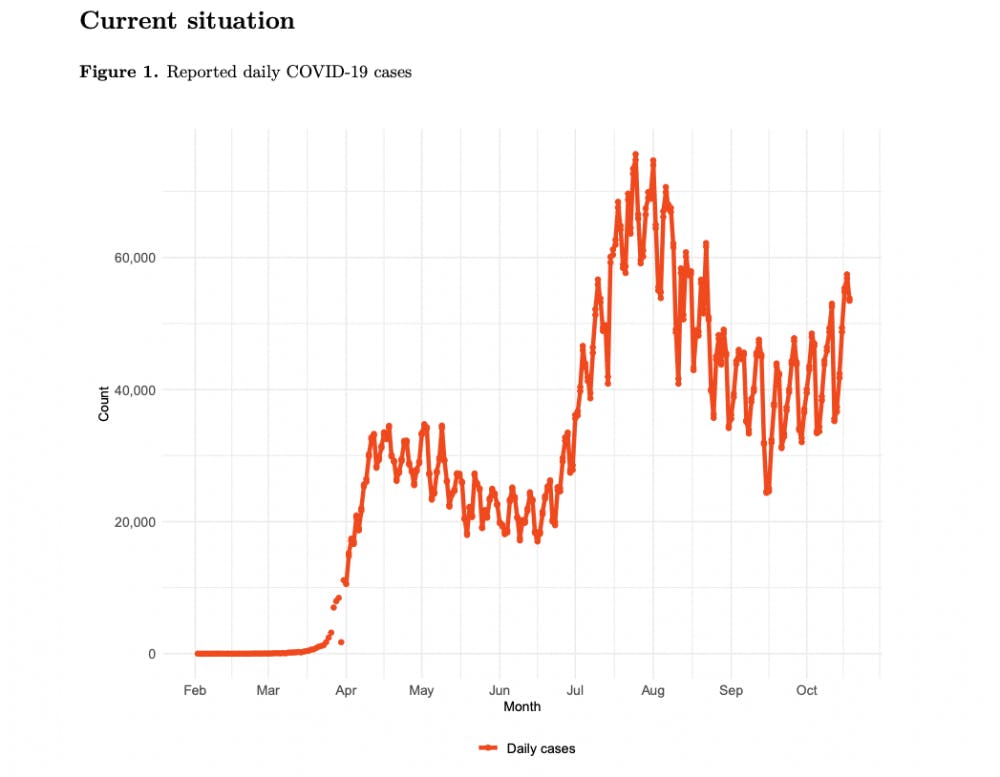COVID-19 cases expected to rise.

Public health and economics experts agree: This winter will pose serious challenges for public health and businesses amid the COVID-19 pandemic.
The combination of the cold weather, holidays and people’s tendency to spend more time inside creates perfect conditions for an increase in COVID-19 cases, said Dr. Ali Mokdad, chief strategy officer for Population Health and professor of Health Metrics Sciences at the Institute for Health Metrics and Evaluation at the University of Washington.
“Viruses love cold weather,” Mokdad said. “A virus, in a simple way, is protein –– surrounded by fat. The fat holds better in cold weather than in hot weather. Second, we move indoors and transmission is more likely because the air is not circulated.”
Mokdad said if 80% of Washington’s intensive care unit beds are full, the state will need to go into another lockdown to prevent overwhelming hospitals further.
Projections by the Institute for Health Metrics and Evaluation predict Washington will hit that critical 80% ICU capacity around Dec. 28.
PeaceHealth St. Joseph Medical Center in Bellingham is already beginning to see an uptick of COVID-19 cases, said Bev Mayhew, senior director of marketing and communication at PeaceHealth.
“Today we have five COVID-positive patients in the hospital, and that represents an increase over the last several weeks,” Mayhew said on Thursday, Oct. 22.
St. Joseph’s Medical Center administrators are confident in their ability to adapt and provide care to COVID-19 patients if a second wave does occur, Mayhew said.
“We have the ability to quickly turn non-intensive care units into COVID-ready units,” Mayhew said. “We have a phased strategy to address an increase in the number of COVID patients that we serve at our hospital at any one time”
An increase in COVID-19 cases this winter could prove disastrous for local businesses that have been steadily recovering from the statewide lockdown that began in March, said Anneliese Vance-Sherman, economist for the Washington Employment Security Department.
At its peak, Whatcom County had an unemployment rate of 17.7% in April; in August, the rate was down to 8.4% according to the Employment Security Department.
“Especially for businesses such as restaurants, winter is going to be a tremendous challenge,” Vance-Sherman said.
Outdoor seating was a major part of restaurants’ and bars’ ability to keep their doors open, Vance-Sherman said, but the colder, rainier weather will make outdoor seating less successful.
“That’s going to put an additional constraint on the businesses,” Vance-Sherman said.
Many local Bellingham restaurants are preparing for the challenges ahead.
Mari Kemper of Chuckanut Brewery said they are improving their outdoor seating for colder, rainy weather, looking into more delivery services and taking customers’ temperatures prior to seating them.
“We’re already working on it. We like to be ahead of the game,” Kemper said.
Despite these innovations, Kemper said business is still somewhat slow, and they have reduced their staff since spring.
Vance-Sherman said the Employment Security Department offers some businesses the Shared Work program, which replaces a portion of an employee’s wage with partial unemployment benefits. This allows people to work and earn the same wage, even if their employer’s revenue is down.
The Employment Security Department also offers Pandemic Unemployment Assistance for those who have lost work due to the pandemic. To limit COVID-19 transmission, people aren’t required to search for a job while collecting unemployment benefits, Vance-Sherman said.
Mokdad said young people need to be particularly cautious this winter because the vast majority of young people who get COVID-19 are asymptomatic but still spread it to others.
“If you want to spend Thanksgiving with your parents or your grandparents, isolate for two weeks, make sure you test yourself,” Mokdad said. “You don't want to spread the disease to your loved ones. Wash your hands. Watch your distance. Wear your mask.”





